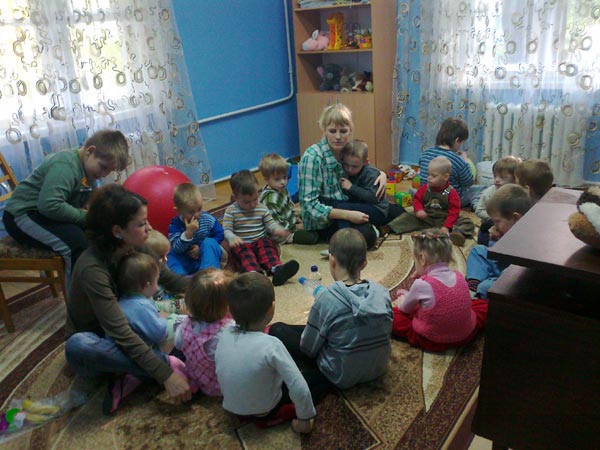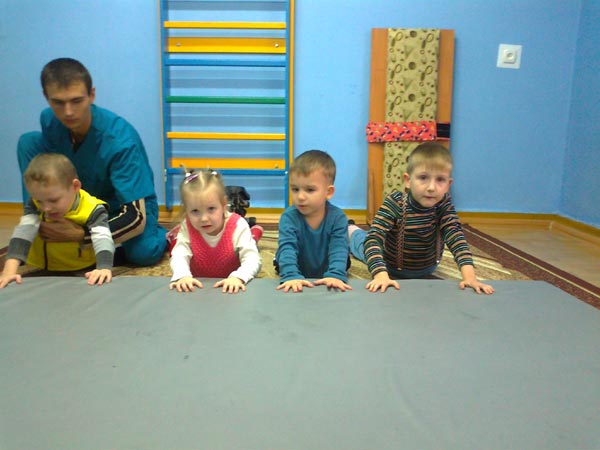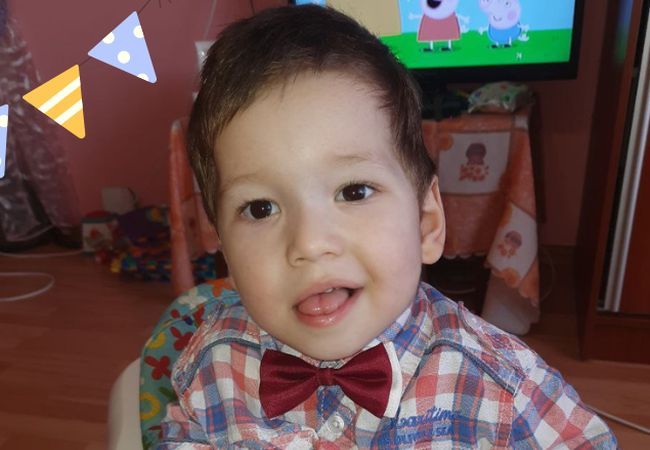
Latest news and articles on the Centre's activities
Centre's Organisers, Employees and Volunteers
Key projects undertaken by the Centre
CENTRE'S ORGANISERS, EMPLOYEES AND VOLUNTEERS
The Centre was created by the parents who united under the "Disabled Children: Right for Life" charity organization.
The children spend all day in this centre. Despite the severity of their conditions, children stay there without their parents.
State-sponsored rehabilitation centres refuse to take on such children because they are not independent and many cannot walk unaidedly.
The children attending our centre have the following conditions: cerebral palsy, autism, Down syndrome, mental and/or speech development delay.

An objective of our children's rehabilitation Centre is to develop as much as possible the independent life skills and self-sufficiency, regardless of the conditions they may have, the medical and social limitations they may be experiencing.
The basis of our work is occupational therapy (ergotherapy), ie. a set of rehabilitation exercises that are aimed at increasing self-sufficiency and tailored to the type of physical disability.
Ergotherapy can increase the quality of life. All the classic methods: massage, exercise therapy, speech therapy, therapeutic education don’t just co-exist as individual treatments but form a complex that fits into the children’s lives. A motivation, reasoning and speech all form within society and form a basis of cognitive processes’ development.
We normalise lives of families as well as children, in every aspect: physical (children avoid getting contractions and deformations); functional (a child can move, eat, read and write); social (a child can attend kindergarten or school etc.); public (the parents can have an active life, go to work and rest).

Our main work streams:
- Helping a child become as independent as (s)he can be in everyday life and taking care of one’s self with minimal assistance from parents and relatives (washing, bathing, getting dressed, eating, during playtime and at school), achieving an improvement of the subjective quality of life.
- A development of normal play and learning abilities, fostering of socio-emotional development, improvement of the basic cognitive abilities, development of community spirit.
- Development of gross and fine motor skills, improvement or preservation of movements.
- Consultations and help with choosing aids for children to help them become more independent and tips to help parents take care of children at home and at school.
Main methods used:
- Sensor integration method;
- Elements of Bobat’s method;
- Cognitive therapy exercises;
- Games;
- Recreation of everyday life situations (via exercises or games);
- Utilising elements of labour-like movements.

Regardless of the type of a disability children have, whether it’s cerebral palsy or a type of mental disability, they all share a similar mental impairment that results in lack of cognitive and emotional-volitional development, overall personal activity – all of the above cause certain development difficulties and affect the school education later on.
The main defect affects the cognitive ability, it’s caused by the organic cortex damage and is combined with the impaired mobility, which negatively affects the development of general cognitive ability.
The best restoration of higher cortical functions occurs when a child starts the rehabilitation programme as young as 18 months or 2 years; the best effect is observed when the visits are regular as opposed to intermittent or course-based.
A wide-spread opinion exists that movement therapy and medical gymnastics can be introduced from the age of three. However, this is not correct. The formation of basic motor skills takes place during the first year of child’s life – from birth to the moment when they start to walk. After that the skills are merely refined.
A need for early rehabilitation care is determined by high flexibility and adaptive power of a child’s brain during the early years.
Formation of the mental functions are of most importance for healthy development and further studies, namely, the sensory training that is only possible with the help of developed fine motor skills, so-called “movement circuits” (hand-vision, vision-hearing, hand-vision-hearing, hearing-speech etc.) which promote connections between abilities to see, hear, feel, move and talk.
Thoughts and eyes of a child move at the same speed as his hand.
The fine motor skills are the basis of development, a type of “locomotive” of all mental processes (attention, memory, perception, reasoning, speech).
The motivation is also established thanks to the fine motor skills. We know that every motor skill, every move can only be acquired with motivation. Therefore these two functions of the nervous system – motorics and sensorics – are not divided into exercise therapy and correction-development sessions. Every educational session is planned with child’s movement abilities in mind, and every exercise therapy session has the educational agenda, too.
The types of sessions we offer in our Centre are: group, subgroup and individual ones. Every child is assigned a tailored rehabilitation and development programme which takes into account the mental and physical abilities of a child. At the same time such areas as independent living skills, gross motor skills, reasoning and speech only form within the society and become the collective consciousness, which means that a child is becoming a person rather than a helpless creature.
All our efforts and energy are directed at increasing children’s well-being and independence so that they don’t have to rely on their relatives day to day.

KEY PROJECTS UNDERTAKEN BY THE CENTRE
We hold parent seminars to share information about the methods we use in our work. We also tell the parents how we create the individual development programmes and track the progress. In order to monitor the effect of the therapy we record the sessions using photo- and video-equipment.
Contact telephone numbers:
+38 099 711 72 15 – Anzhelika Psaryova
+38 066 274 23 34 – Yevgenia Vatazhok



